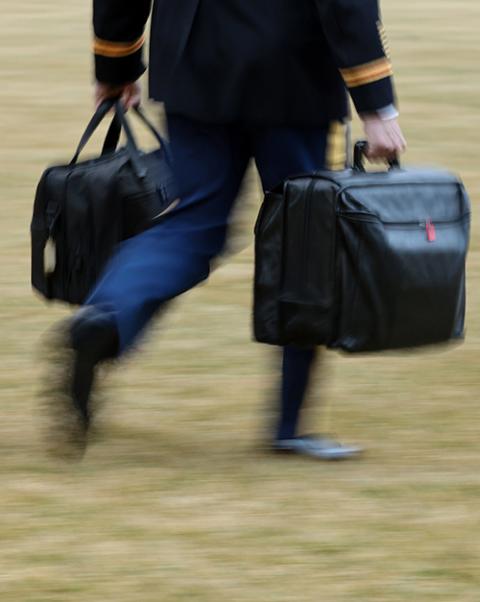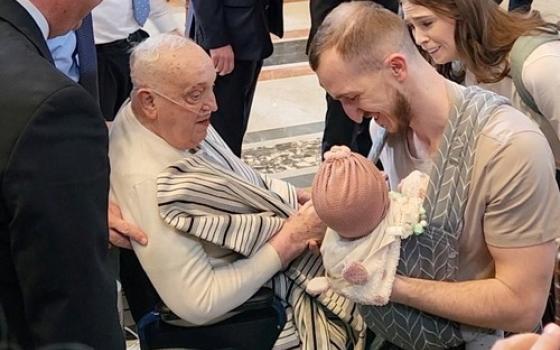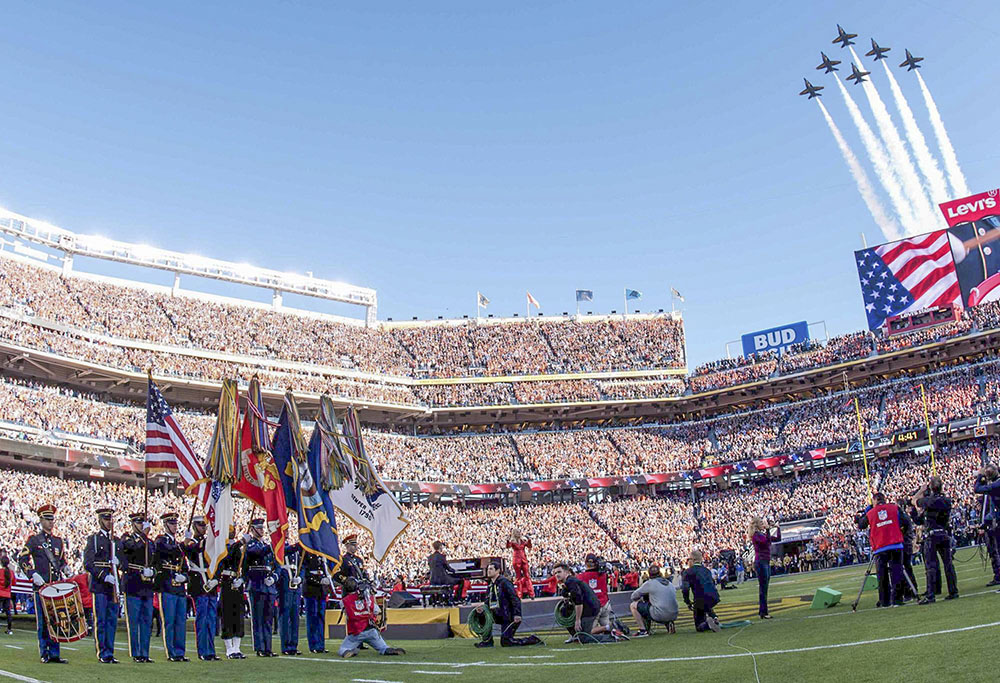
The Navy Blue Angels perform a flyover in the opening ceremonies of the Super Bowl at Levi's Stadium in Santa Clara, California, Feb. 7, 2016. (Wikimedia Commons/U.S. Department of Defense/Spc. Brandon C. Dyer)
Forty years ago this May, the United States bishops approved a landmark pastoral letter that opened with a line taken from the Second Vatican Council's 1965 document on modern warfare: "The whole human race faces a moment of supreme crisis in its advance toward maturity."
Whether and how the human race has matured during the past six decades is debatable, but the weapons that prompted that initial alarm have grown more sophisticated, deadlier and more widespread than ever. That reality has led a U.S. cardinal to urge dramatic changes in the church's traditional approach to war, moving away from the just war theory and placing nonviolence into a new and central role in church teaching.
That earlier bishops' document, "The Challenge of Peace: God's Promise and Our Response," elaborated specifically for U.S. Catholics "the crisis of the moment [that] is embodied in the threat which nuclear weapons pose for the world and much that we hold dear in the world."
It should be of only mild consolation that the world has not experienced the ultimate horror of that threat in the six decades since the promulgation of the Vatican II document "The Pastoral Constitution on the Church in the Modern World" and the bishops' pastoral 20 years later.
Among issues for which U.S. Catholics might have special responsibility, none has been more insistently pursued by successive papacies than world peace and the arms race.
In the interim, we've lived on a knife's edge, a miscalculation or a technological glitch or a madman's reaction away from the unleashing of forces that could destroy the planet.
It is gratifying, then, to see Cardinal Robert McElroy of San Diego raising the issue in today's fraught climate, as he did at a March 1 speech at the University of Notre Dame. He does so not only as a reflection on what has already been agreed upon but also as a call to recognize "a new moment." It is a moment marked by "the need to fundamentally renew and prioritize the claim of non-violent action as the central tenet of Catholic teaching on war and peace [emphasis in original]."
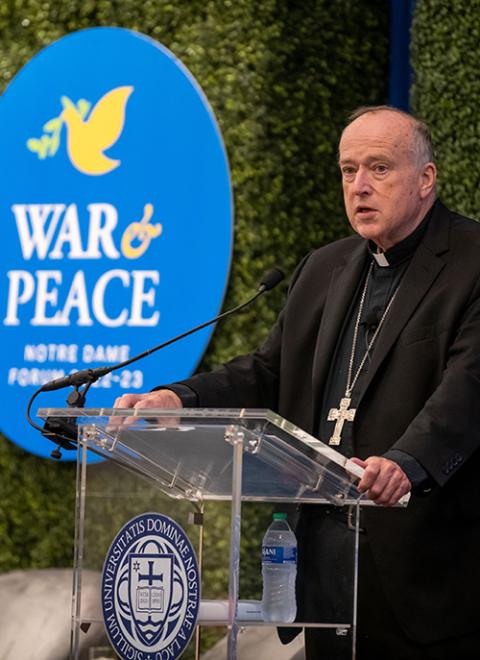
San Diego Cardinal Robert McElroy speaks at an event titled "New and Old Wars, New and Old Challenges to Peace" at the University of Notre Dame in Indiana on March 1. (University of Notre Dame/Barbara Johnston)
McElroy is a serious church leader. He occupies unusual space in the current circumstance, possessing both an uncommon expertise and a detachment from the partisan cubicle in which much of the U.S. episcopacy has imprisoned itself. Those qualities enable him to speak to pressing issues across political and ideological boundaries.
The call to acknowledge a "new moment" in pursuit of peace is not a radical departure from what the church has long recognized. Vatican II urged "a completely fresh reappraisal of war." The U.S. bishops, in their pastoral letter, said the traditional approach that sought to limit resort to force was inadequate and endorsed the development of "a theology of peace."
A core issue
In his talk at Notre Dame, McElroy raised anew perhaps the most unsettling issue for U.S. Catholics, if one that remains beneath the surface in discussions of compelling moral issues. Militarism and the arms race hit at a fundamental self-image for Americans: military extravagance, quick resort to force in recent decades, and the cultural and political centrality of the military-industrial complex.
The bishops' 1983 document was fashioned over two-and-a-half years before passing with a vote of 238-9. While it was subjected to countless amendments and the tug and pull of deeply held differing views at the height of the Cold War, an unyielding sense of urgency pulses through it.
The bishops, amplifying the foundational work of Vatican II, were uncompromising in their assessment. "We are the first generation since Genesis with the power to threaten the created order," they wrote.
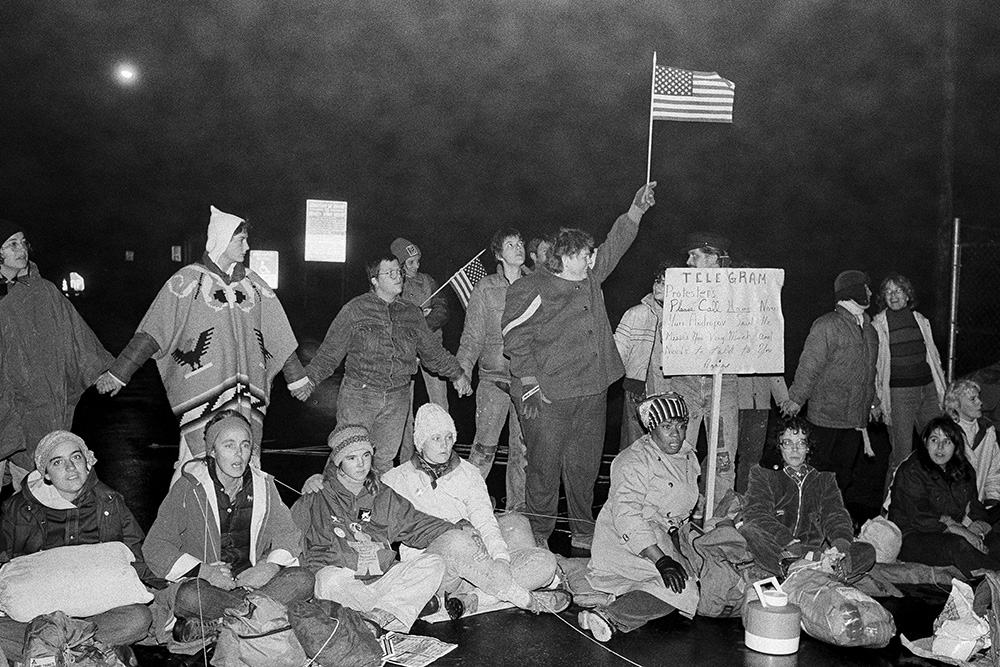
Antinuclear protesters sit on the ground in an attempt to block a gate at Seneca Army Depot in Romulus, New York, as counter demonstrators join hands and wave a flag behind them on Oct. 25, 1983. (AP/Ron Frehm)
Responsibility for dealing with the threat, they said, was especially incumbent on the United States, the world's major nuclear power and the only nation to have deployed atomic weapons.
"The crisis of which we speak arises from this fact: nuclear war threatens the existence of our planet; this is a more menacing threat than any the world has known. It is neither tolerable nor necessary that human beings live under this threat," they wrote.
If the nation's bishops were to revisit the issue today, regardless of varying views on policy, they would certainly concede that the danger of war and of nuclear brinkmanship has intensified almost immeasurably since that 1983 letter. They would recognize with a simple internet search that the world has grown dangerous beyond the imagination of that letter, with new weapons systems, new technology and mountains of money being spent on development of those new means of destruction. The weapons developers and dealers have far outpaced the U.S. church's consideration of the growing militarism.
Consequently, McElroy sees "three major shifts in Catholic thinking" underway:
- As a result of ongoing wars, new weaponry and "countless deaths," there is a perceived need to move nonviolent action to a more central position in Catholic teaching.
- The failure of the just war framework to be a constraint on war or provide a pathway to peace "calls the Church to redesign its moral framework for permitting war in dire circumstances."
- The failure of nuclear deterrence has led to "breakdown of the arms control regime and the possibility of the use of tactical nuclear weapons," highlighting the need for a new approach.
It is no exaggeration to say that among issues for which U.S. Catholics might have special responsibility, none has been more insistently pursued by successive papacies, in documents, visits to the United States, and appeals before the United Nations, than world peace and the arms race.
McElroy points out that Pope Francis "has utilized the trajectory of all of these statements to construct a framework for Catholic teaching on war and peace that places non-violence rather than the just war-ethic as the dominant prism through which to evaluate decisions in situations of deep conflict."
Right to self-defense
It is essential to note that neither pope nor cardinal is naive about the realities of the need for resort to force in extreme cases. Neither is an absolute pacifist. Francis, while pleading for an end to the war in Ukraine, nonetheless has endorsed Ukraine's right to defend itself.
In his talk, McElroy declares "the moral claim for defense of Ukraine is clear and compelling. A sovereign nation with a historic culture and identity were invaded with the goal of dismembering their homeland. Thus, the fundamental moral justification for military action is unassailable."
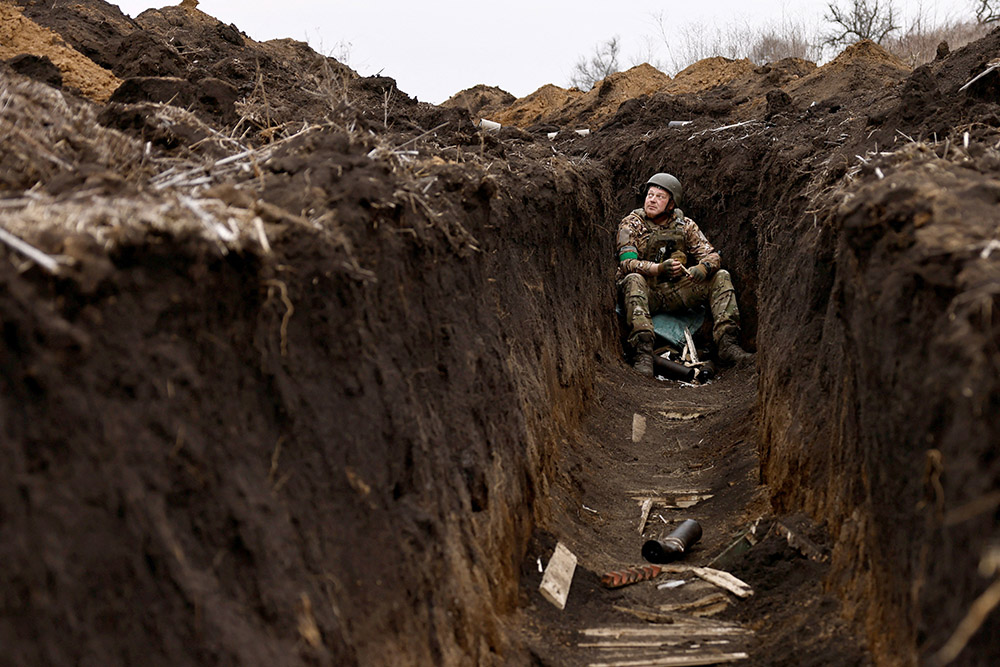
A Ukrainian soldier listens to artillery fire from his bunker at a front-line position near Bakhmut March 16, 2023, amid Russia's attack on Ukraine. (OSV News/Reuters/Violeta Santos Moura)
He questions, however, the effectiveness of the just war theory in providing "an ethic which is able in the present day to navigate the moral choices that Ukraine and its allies" will continually face in repelling Russia's advances.
The cardinal, who holds doctorates in both politics and moral theology, explains that those moral choices run beyond the capacities of the traditional just war theory, which increasingly has been used not as a preventative but as a justification for going to war.
The rethinking of just war theory, he said, must include "ethics of war termination and the moral obligations of all participants." In the case of Ukraine, for instance, that includes the third parties that are supplying weaponry to the invaded country.
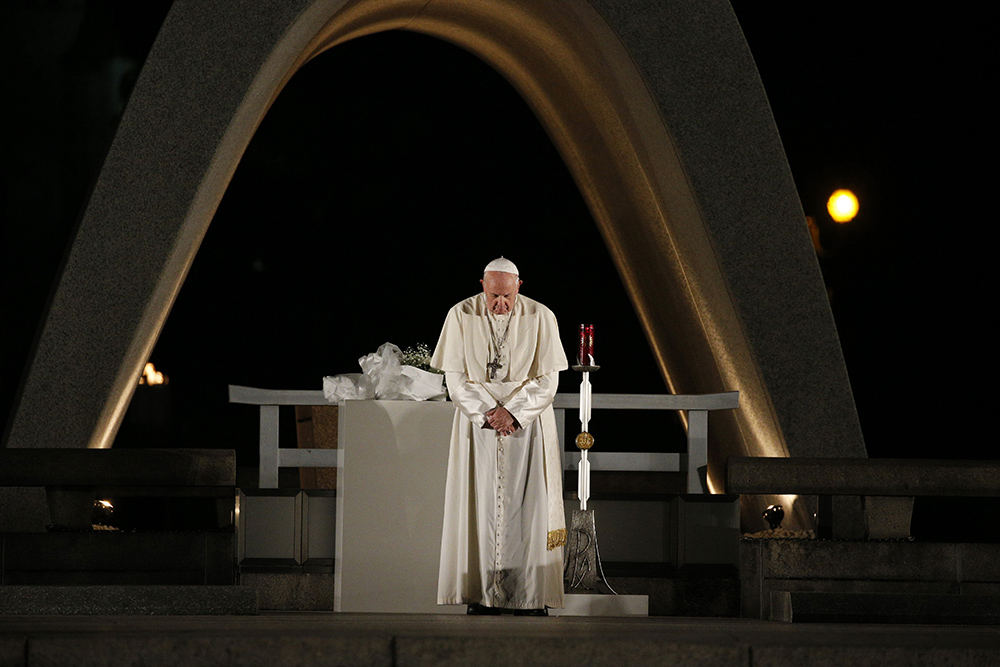
Pope Francis participates in a moment of silence during a meeting for peace at the Hiroshima Peace Memorial in Japan on Nov. 24, 2019. (CNS/Paul Haring)
Finally, the new moment lands at the point driven by statements of successive popes and the magisterium for the past 60 years in which "the church has demanded that nuclear weapons be removed from the face of the earth," McElroy said.
The church, he said, has moved from toleration of nuclear weapons as a means of deterrence to condemning them as "a destabilizing element in the international system that creates a false sense of security, encourages the proliferation of nuclear weapons, threatens the environment and robs from the poor."
A monumental ask
McElroy is raising extremely difficult questions for U.S. Catholics. If our culture is split in ways not seen since the Civil War, the military stands as one of the remaining unifying elements. Rarely do serious debates arise over curbing military spending. The consensus is apparent in packed stadiums where sports fans stand and applaud flyovers of some of the deadliest weapons ever produced. Arenas filled with Americans of every political persuasion stand in reverence at the entrance of military color guards. No one questions what it all represents.
Advertisement
In raising once again the repeated pleas of popes and previous bishops, the cardinal is asking us to be open to such questions. In any moment, that would be a major ask; in the current moment, the ask is monumental.
Perhaps this new synodal era in the church would present the best opportunity for at least placing such difficult issues in the public realm for consideration.
The assembled bishops at Vatican II agreed: "The arms race is one of the greatest curses on the human race" and is "to be condemned." Perhaps we should begin taking that charge seriously.
The U.S. church can continue to define itself by a few culture war issues to the exclusion of most others. Or our leaders can decide, weighed against the magnitude of threat posed by modern warfare and the nuclear nightmare, that such a tight focus is too small.

